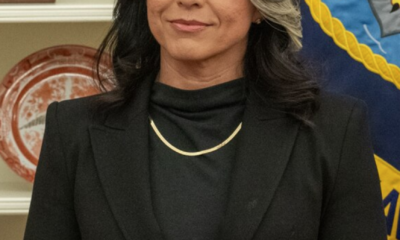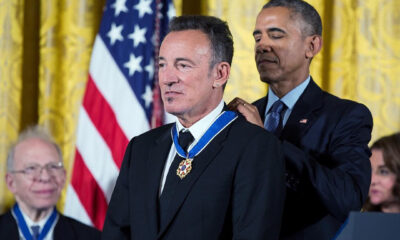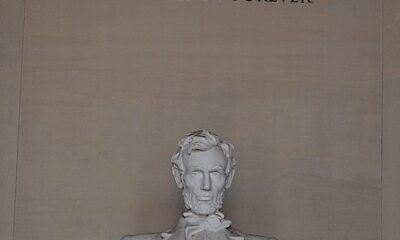Education
The School of Civic Leadership Looks to Protect the American Experiment
The UT Austin School of Civic Leadership is a first-of-its-kind institution dedicated to saving the American experiment and system.

Etched onto the side of the Main Building at the University of Texas at Austin is a verse taken from John’s Gospel: “Ye shall know the truth and the truth shall make you free.” Justin Dyer says that this represents UT’s Austin’s North Star: “The university is a truth-seeking institution.”
Exceptional American civics
A faculty partner of the Jack Miller Center, Dyer is the author of eight books on natural law, constitutionalism, and American political thought. He previously worked at the Kinder Institute on Constitutional Democracy at the University of Missouri but was drawn back to UT Austin, where he received his Ph.D., to head its Civitas Institute in 2022. In March of this year, Dyer was appointed to serve as the inaugural dean of UT Austin’s School of Civic Leadership (SCL).
Dyer says that once it officially opens, SCL will give students the opportunity to “study the Western tradition and American constitutional history.” And SCL will inculcate “the skills and aptitudes” that students need “to lead in a free society in the twenty-first century.”
“Having a dedicated place at the university to draw in multiple disciplines to focus on” the overarching questions that animate our way of life “in a serious, integrated and interdisciplinary way … is desperately needed right now,” Dyer notes. SCL aims to fulfill that goal.
This project is especially important for Americans, Dyer says. In a country founded on certain political truths, students must understand “the principles that sustain their own freedom,” he maintains. Dyer points to UT Austin’s own motto as proof: “Education is the guardian genius of democracy.”
Educated citizens
“We need an educated citizenry in the United States in a republican regime in order to carry forward the project of self-governance,” Dyer observes. Toward that end, he states that SCL seeks to inculcate in students an understanding of civics that focuses on “the study of the rights and duties of citizenship.”
“The core elements that make up a civics education include the intellectual traditions that go into our founding, the ideas and principles that undergird our Constitution, and the way those principles can be maintained over time – which are the very principles that sustain the university in its truth-seeking mission,” Dyer says.
Rather than promoting “action civics,” which is centered around having students participate in political campaigns and voting, SCL is based on a discussion of fundamental political questions. What does it mean to be a good human being and citizen? How should we understand the constitutional principles of the American system of government?
Dyer argues that institutions like UT Austin must inculcate civics because they have a public duty to teach the habits of a free people. Professors need to explain the importance of reason-based inquiry, weighing standards of evidence, and cross-examining arguments that people take. And they must also emphasize the “traditional virtues of character.” Dyer says that SCL will feature a course, “Excellence of Character: The Virtues,” that will introduce students to the importance of virtue ethics.
Civic leaders must have character
This focus on character formation is crucial to producing civic leaders, a key aim of SCL’s. Dyer points out that UT Austin undergrads mainly come from the top six percent of their high school graduating classes. A sizeable number of these students will go back to their communities after graduation and will become civic leaders in some capacity. Dyer says that SCL will ensure that they are properly equipped to safeguard the common good and the liberties enshrined in the Constitution.
Dyer reports that SCL is currently busy “hiring faculty, developing new courses, and creating opportunities for students.” This fall, SCL is collaborating with the College of Liberal Arts to launch a minor in Philosophy, Politics, and Economics. Major and minor degrees in civics will be offered starting in the fall of 2025. Interested students can start applying on August 1, 2024.
Working to teach the American system
At UT Austin, both the School of Civic Leadership and the Civitas Institute work together to educate students. Ryan Streeter, formerly at the American Enterprise Institute, is executive director of the Civitas Institute. SCL is the academic affairs part of the project. Together, these programs offer a unique combination unlike any other civics program in the country.
Dyer hopes that 10 years from now, we “will be able to look back with pride” on the field of civics education. He thinks we’re in a seminal moment that will profoundly change how colleges and universities approach civics teaching.
Above all, Dyer hopes that the School of Civic Leadership will have a real effect on protecting and maintaining the American experiment in liberty. As Ronald Reagan stated in his First Inaugural Address: “Freedom is never more than one generation away from extinction.”
This article was originally published by RealClearEducation and made available via RealClearWire.
Mike Sabo, formerly a research assistant for the B. Kenneth Simon Center for Principles and Politics at The Heritage Foundation, is the editor of Real Clear's American Civics portal.
-

 Civilization5 days ago
Civilization5 days agoWhy Is Tulsi Gabbard in Georgia? Because Trump Sent Her There
-

 Guest Columns5 days ago
Guest Columns5 days agoModeration Is the Most Disruptive Movement in American Politics
-

 Civilization4 days ago
Civilization4 days agoNot ‘Might Makes Right’ but ‘Might Should Serve Freedom’
-

 Civilization3 days ago
Civilization3 days agoThree Radical Ideas to Reform the Scientific Enterprise
-

 Education3 days ago
Education3 days agoWaste of the Day: Universities Pile Up Billions in Research Overhead Costs
-

 Guest Columns3 days ago
Guest Columns3 days agoCan AI Write a Better Protest Song Than Bruce Springsteen?
-

 Executive2 days ago
Executive2 days agoWaste of the Day: L.A. Funds Activists, Then Group Sues
-

 Civilization4 days ago
Civilization4 days agoHow Democrats Have Mastered Modern Elections








